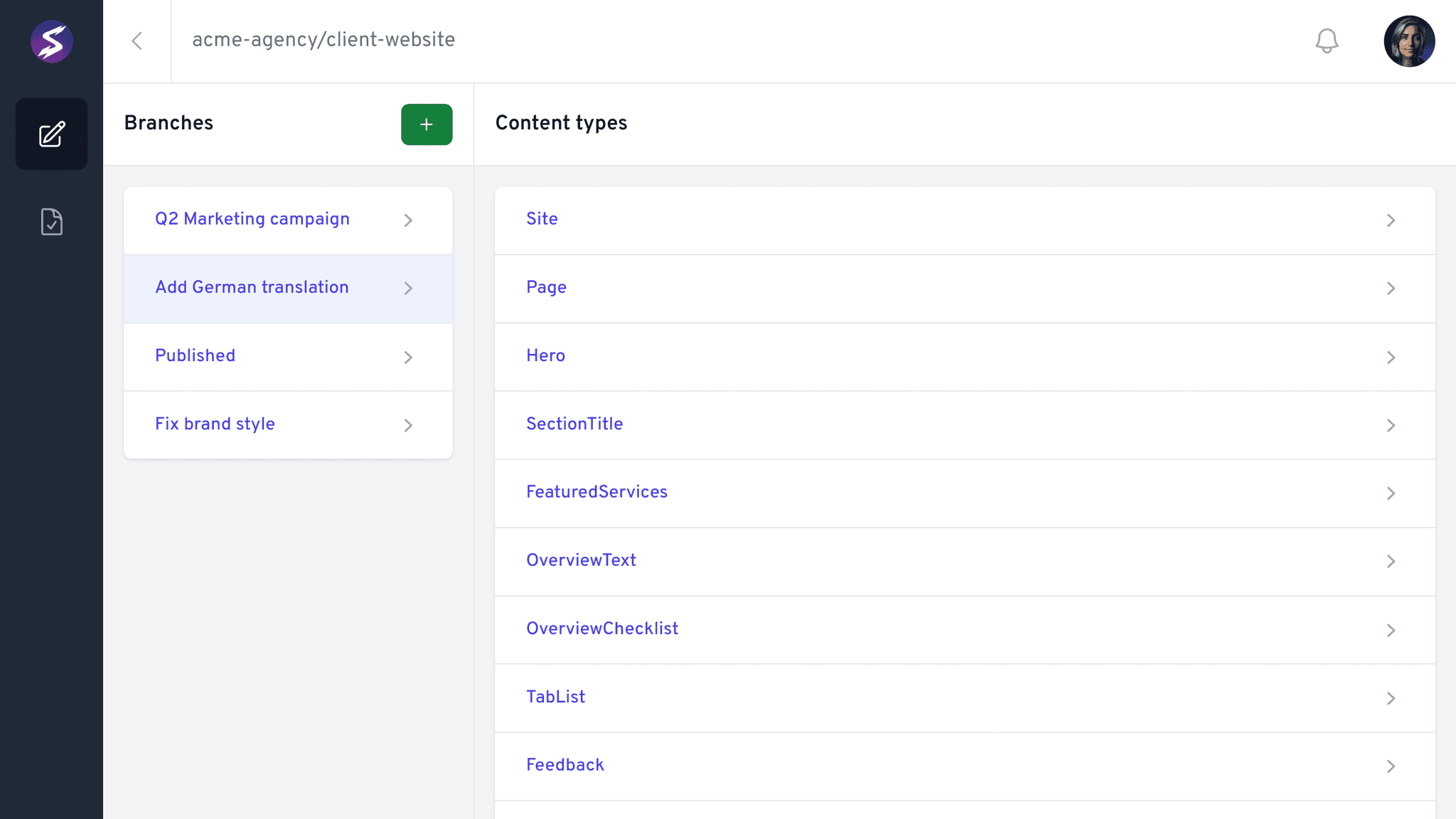Git-native Workflows for Your Data
Commitspark provides tools to put your data under Git version control, enabling even non-technical users to take advantage of powerful Git workflows that were previously only available to software developers.

Git-based Data Management in Action
Real-World Use Cases
Commitspark offers great flexibility in the types of data that can be managed. This allows bringing Git workflows as a productivity booster to a wide range of domains.
- Commitspark as a Content Management System (CMS)
- Unlock reliable and efficient content publishing workflows not possible in traditional CMSs.
- Commitspark for Configuration Management (CM)
- Get tight control over application configuration without complex infrastructure tooling.
- Augment a PIM System with Commitspark
- Ensure product data is always correct and all changes are fully auditable.
Reimagining Data Management Workflows
Create, Review, Publish, Maintain, Retire
Managing data in a team leads to the same workflow challenges that software developers encounter when managing software code. With Commitspark we make Git - the undisputed champion of software management tools - available for data management by non-technical users.
Open Source Data Editing Front-end
Boost Capabilities of Non-technical Users
Your data editors will love the Commitspark data editing UI that enables them for the first time to work with Git without requiring deep understanding of how the underlying technology actually works.
- Simplifies Git
- so non-developers can take advantage of Git features.
- Git's powerful foundation
- remains available behind the scenes for experts and developers.
Branching and Merging
Reduce Conflicts and Errors
With Commitspark, multiple editors can modify data simultaneously on the same project without creating conflicts, reducing stress and need for manual coordination.
- Use branches
- to keep unrelated data changes apart. This makes it easy for your data editors to work independently.
- Use pull requests
- to review changes before merging, allowing you to establish sign-off and QA processes that assert data quality.
GitHub, GitLab & Co.
Prevent Vendor Lock-In
Commitspark keeps you in control by connecting to a Git repository and provider of your choice.
- Fully Open Source
- releases of all our core components ensure you are never locked into Commitspark.
- Keep your own Git repository
- and simply connect Commitspark to read and write data, letting you remain owner of your data at all times.
- Pluggable Git hosting adapters
- allow you to connect Commitspark to any Git hosting provider or custom hosting for full vendor independence.
GraphQL + YAML
Get a Boost from Open Standards
Commitspark relies and builds on open standards whenever possible, so much so, that your technical teams most likely already know how to work with Commitspark even if they have never used it before.
- GraphQL schema file
- serves as a foundation and defines your data model as well as the auto-generated GraphQL API structure.
- YAML files for data
- make it possible to use Git for storing any structured data you may have while keeping it in a human-readable format at all times.
Git Technology
Speed Up Your Applications
With Git's ability to track data changes, Commitspark unlocks an extremely powerful caching mechanism that speeds up your applications' access to data. And as your Git repository is already hosted, we don't need to add any extra hosting for Commitspark.
- Fast API responses
- due to an internal caching logic based on Git's ability to track changes to data through commit hashes.
- Hosting is optional
- when runing Commitspark's data API, as it can be integrated straight into your NodeJS applications as an NPM library and connect directly to where your Git repository is already hosted.
Tags and Semantic Versioning
Increase Application Stability
Never again accidentally break your applications with bad data: With your data and Commitspark's API definition together in the same Git repository, all strategies your developers use to keep applications running can now be employed to protect your application data.
- Guaranteed API stabilty
- is reached with Commitspark keeping the structural definition of its data API right alongside your data in Git, allowing you to keep perfect control over API changes.
- Versioned releases
- through Git tags let you enforce that only approved and compatible data reaches production.
CI/CD Pipelines
Automate Reviews
With Commitspark, your developers can easily build automated data validation pipelines that enforce your own business rules. This enables data editors to fix mistakes before they reach production, such as issues that are hard to spot manually.
- Automated reviews
- are key to ensuring the consistency and accuracy of data before it is published.
- Prevent errors
- from hitting production with automated tests that prevent editors from merging into production when issues are found.
Git Commits
Assert Data Integrity and Auditability
Commitspark is built on Git which was designed from the ground up to securely track all changes to data in a chain of commits, i.e. records that prove exactly who did what at any point in time.
- Cryptographically secure
- chains of data changes (commits) allow providing proof of exactly which data existed at any point in time.
- Transaction safety
- is established automatically by Commitspark by only accepting data changes that attach seamlessly and fully to a previous commit.
- Referential integrity
- in Commitspark ensures that a reference from one data entry to another is always valid for as long as the reference exists.
GraphQL type safety
Increase Developer Productivity
In contrast to REST data APIs, Commitspark's use of standards-compliant GraphQL allows developers to easily generate type-safe data structures for use in their applications.
- Type safety
- comes out of the box with Commitspark as a result of using GraphQL, saving developers time from writing boilerplate type validation code.
- Type generation
- based on Commitspark's GraphQL API allows developers to easily generate application components that match exactly the data structures stored in the underlying Git repository.
Want updates about our next steps?
Sign up for our newsletter.